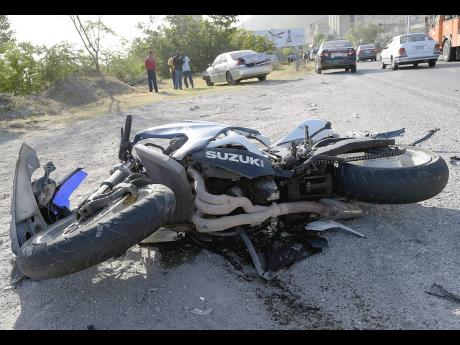Cut out the careless and reckless driving for the new year
It will not be a jolly good 2022 if we fail to cut the careless and reckless driving for the new year. “We need to stop the dangerous driving on the roads, and make it easy for the other driver,” says Sophia Dean.
“Drive within the speed limit, check your tyres regularly, wind up windows at stop lights and be patient and courteous on the road,” says Ian Keith Goldson, director of ICT at National Land Agency, who drives almost daily to work. “Careless driving has no place on the road,” Goldson adds.
To avoid any form of collision, motorists are encouraged to try to keep adequate space between their car and others on all sides. Stay in the middle of your lane. Ensure that there is enough room ahead to stop or pass safely. “The space between you and other vehicles gives you time to react in emergencies. A driver needs good judgement in stopping, starting and turning. He also needs to know the traffic rules, signs and signals, which help a great deal,” says Carol Nangle, motor vehicle examiner. The driver must handle many driving tasks in city traffic. Even at slow speeds, heavy traffic in all towns in Jamaica means more things to observe.
For the new year, motorists should adhere to the following pointers:
1.Try to cooperate with the other drivers. Communicate with the other motorists using all the signals. Also, be in the lane that shows where you intend to turn.
2.Use your turn or hand signals to tell the other driver what you are going to do. In addition, pump your brakes, which can bring more attention to your turn lights.
3.Get into the habit of catching the other driver’s eye. Make good use of your horn to warn other drivers where you are. At nights, a genuine quick flick of your lights, from low to high beam and back, can be helpful.
4.Be patient amid the heavy weekday traffic. Try as best as possible not to change your mind or act quickly without giving adequate notice. “Try not to let the rush-hour traffic get on your nerves; rely on your observation, alertness, defensive driving skills,” advised Dr Valerie Freckleton, consultant psychologist. She says drivers must “be alert, be prepared, and must, act in time”. When traffic is heavy, drivers need extra time to react. This means drive more slowly, as reducing your speed can help to gain time to deal with any road challenges. Dr Freckleton also suggests that motorists rest before they hit the road. This implies getting a good night’s rest, do not take any drugs that could make you drowsy while driving, and do not drive for very long hours. Driving can be dangerous if you are tired.
5.Drive more slowly, cautiously and watch carefully for the action and movement of other road users. Be extra careful of pedestrians, less visible things such as bicycles and motorcycles. Also look out for cars in front, parked vehicles, cars approaching and children.
6.Be careful at intersections, especially if the traffic lights are out due to a power failure.According to Janice Brown, educator from Clarendon, there should be absolutely no cellular phone texting while driving, as it takes only a second to run into someone’s motor car.



